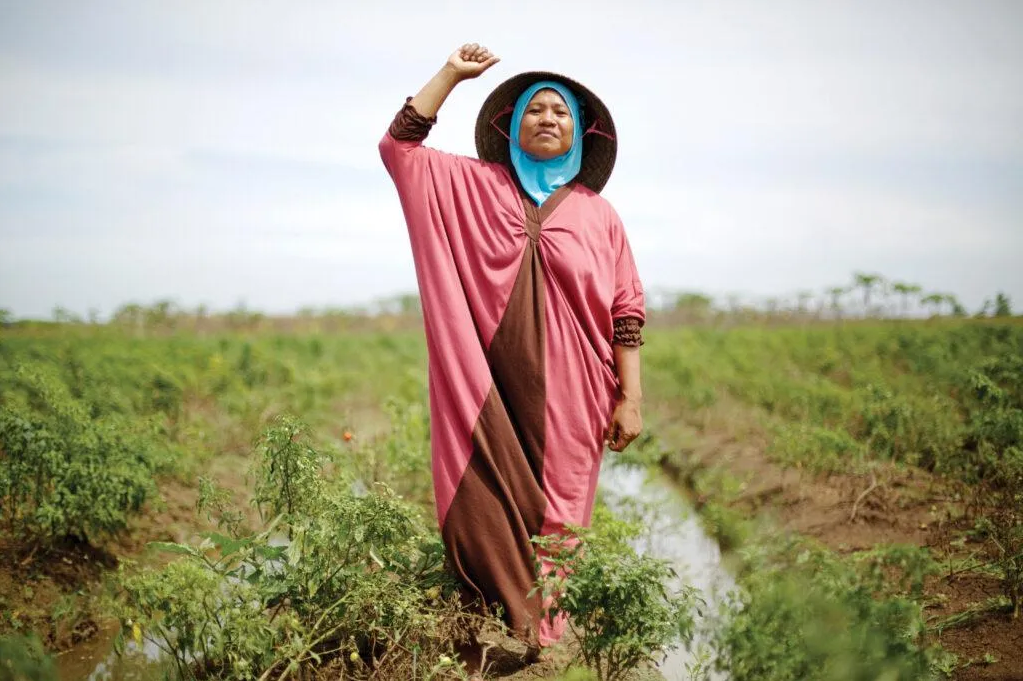
In the face of intersecting climate, food, and inequality crises, the resistance led by peasants and Indigenous peoples is gaining new momentum worldwide. The adoption of the United Nations Declaration on the Rights of Peasants and Other People Working in Rural Areas (UNDROP) in 2018 has emerged as a key tool to assert land, food, and environmental justice. From the Nyéléni process for food sovereignty, global justice, and system change to the strategic process of the People’s Summit ahead of and during COP30, movements across the world are converging with demands for systemic change.
UNDROP: A Legal Tool in the Hands of the Oppressed
Adopted by the United Nations (UN) in 2018, the United Nations Declaration on the Rights of Peasants is more than a symbolic text – it is a hard-won milestone, forged by decades of grassroots mobilization, led largely by La Via Campesina and its allies. UNDROP recognizes peasants as political actors with collective rights to land, seeds, water, biodiversity, and traditional knowledge. It asserts that these rights are essential not only for the dignity of rural communities, but also for achieving food sovereignty, environmental sustainability, and climate justice.
It is important to note that while UNDROP can serve as a tool to develop new policy initiatives aligned with its language and provisions, it does not belong only in courts or among policymakers: it is also an educational tool. Movements use it to educate their communities, frame their demands in international forums, and pressure governments to incorporate its principles into national legislation, applicable in all countries. International law thus becomes a living document, rooted in lived struggles.
In today’s context of converging crises – climate degradation, militarized resource grabs, and injustices linked to the energy transition – UNDROP acts as both shield and sword. It provides a framework to resist the criminalization of peasants and other small-scale food producers, as well as the expansion of agribusiness and carbon markets into peasant and Indigenous territories. UNDROP is invoked in local struggles to demand access to land, protect seeds against corporate patents, and put an end to exploitative projects and greenwashing that displace communities under the guise of “sustainability” or so-called “nature-based solutions.”
Nyéléni: Strengthening Power from the Ground Up to Change the System
The power of UNDROP lies in the hands of organizations with the will and commitment to build a more just and unified world – and nowhere is this more evident than in the Nyéléni process for food sovereignty, global justice, and system change. The process is organizing towards a third World Nyéléni Forum in September 2025: a call from the robust global food sovereignty movement that has emerged over the past two decades and has gained significant political recognition at both national and international levels.
The first Forum took place in the village of Sélingué, in southern Mali, in 2007. It is named after Nyéléni, a legendary woman from rural Mali known for domesticating fonio and samio (grains native to West Africa) and for being a pioneer who resisted social discrimination and refused marriage. She even worked the land to become a better farmer than most of the male farmers around her.
A second Nyéléni Forum was held in 2015, during which movements agreed on a common vision and understanding of agroecology, as well as shared strategies to promote and defend it against corporate capture.
Since the first Nyéléni Forum, the food sovereignty movement has achieved numerous victories – the democratic reform of the UN Committee on World Food Security (CFS) to give civil society a voice in this leading multilateral space for food policy (2009), the adoption of UNDROP (2018), and the recognition by CFS experts of agroecology as the best path to address environmental, hunger, health, and inequality crises (2019).
In 2023, the food sovereignty movement called for a process to build a common political action agenda based on intersectional social movements for food sovereignty, global justice, and system change, with a milestone at the 3rd World Nyéléni Forum in September 2025 in Sri Lanka. For this process, UNDROP represents a key tool to defend human and peoples’ rights, including the right to access and control their territories and commons, to peace and democracy, and to resist corporate power and overcome all forms of oppression.
Towards the People’s Summit and a Just Transition Rooted in Food Sovereignty
The declarations and strategic documents of the Nyéléni Forums serve as collective roadmaps that inform both global advocacy and local organizing.
This year, in 2025, the Nyéléni Forum is also integrated into the process of the People’s Summit, allowing movements to organize and align common agendas ahead of the climate summit COP30 in Brazil. Led by grassroots organizations and social movements, the People’s Summit seeks to reclaim the climate debate at COP30, in contrast to negotiations dominated by elites and corporations.
Rather than relying on empty net-zero promises and carbon offset markets that place immense pressure on lands in the Global South and transform soils and territories into monocultures, agribusiness commodities, and similar products, this movement is building a political convergence space rooted in justice and accountability.
In Belém, movements will amplify the voices of those most affected by climate change – communities whose survival depends on land, water, and besieged food systems. The People’s Summit offers a vision of climate justice already being implemented by communities around the world, with real solutions such as a feminist and just energy transition, agroecology, popular and feminist economies, and community forest management.
Translated from the original French by Tired Earth (The Editorial Board)

Comment